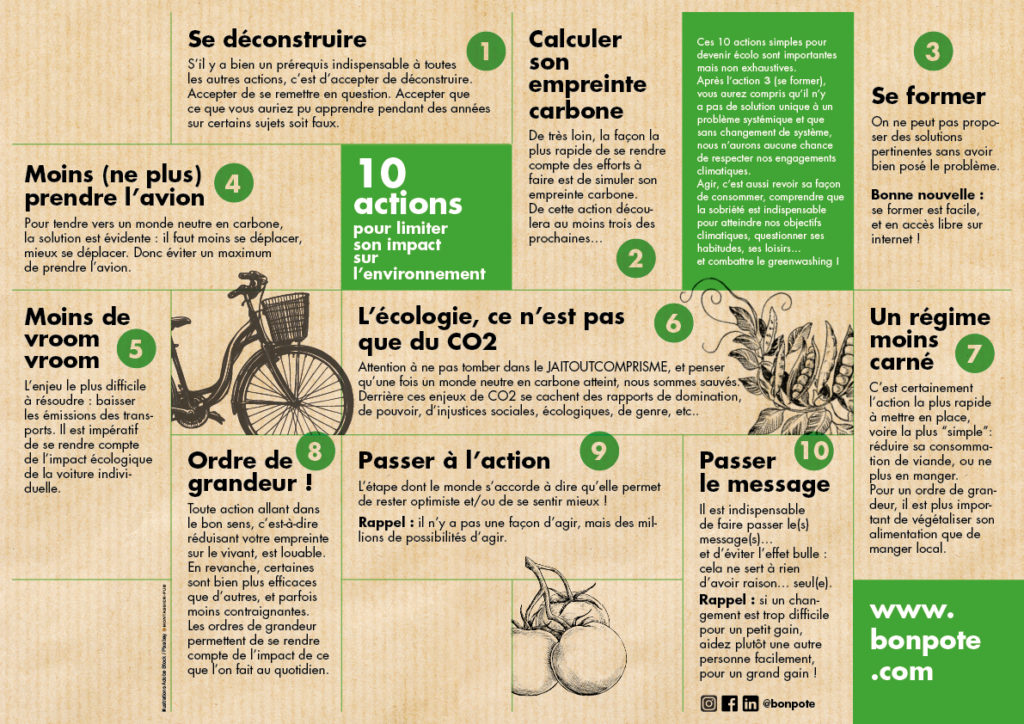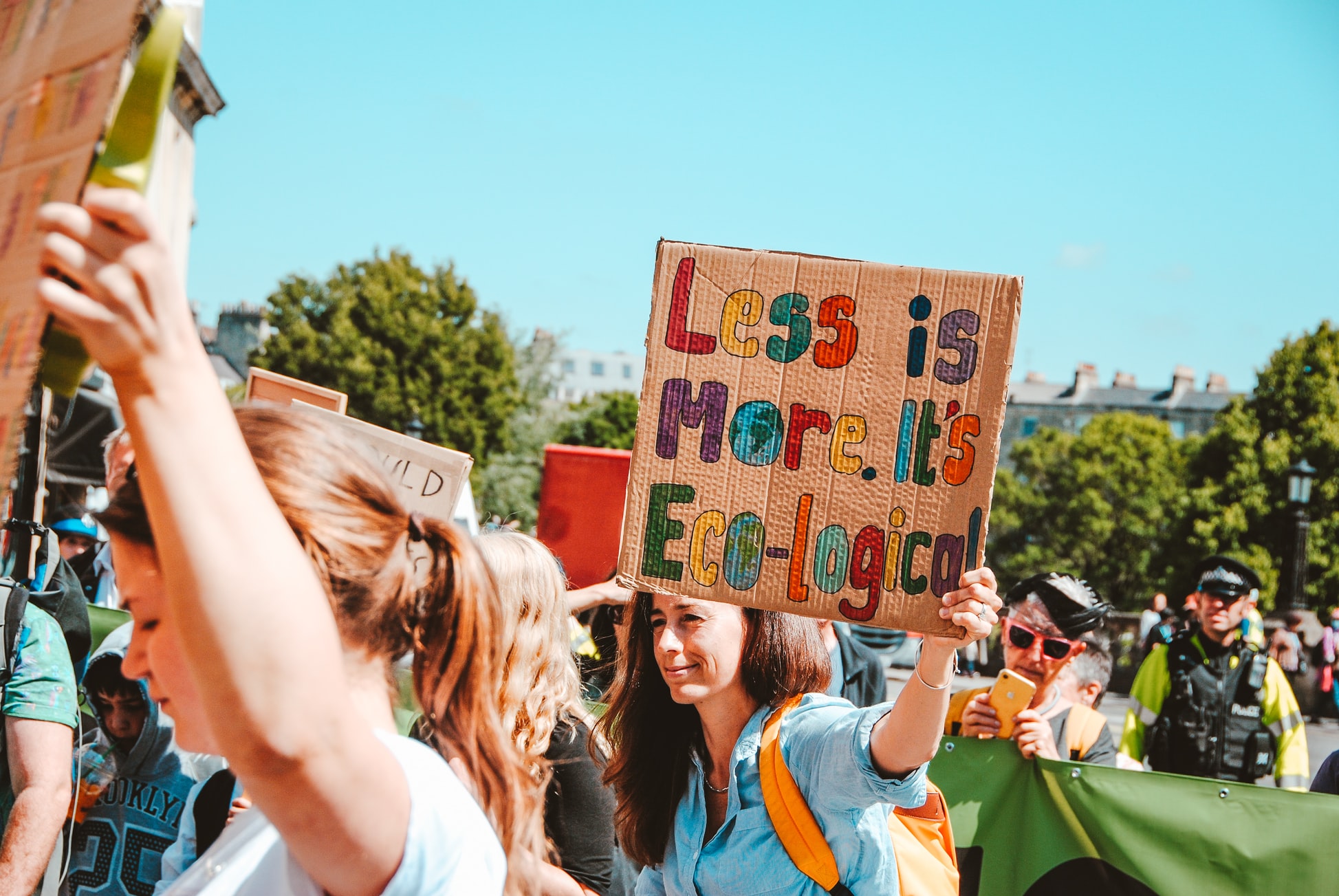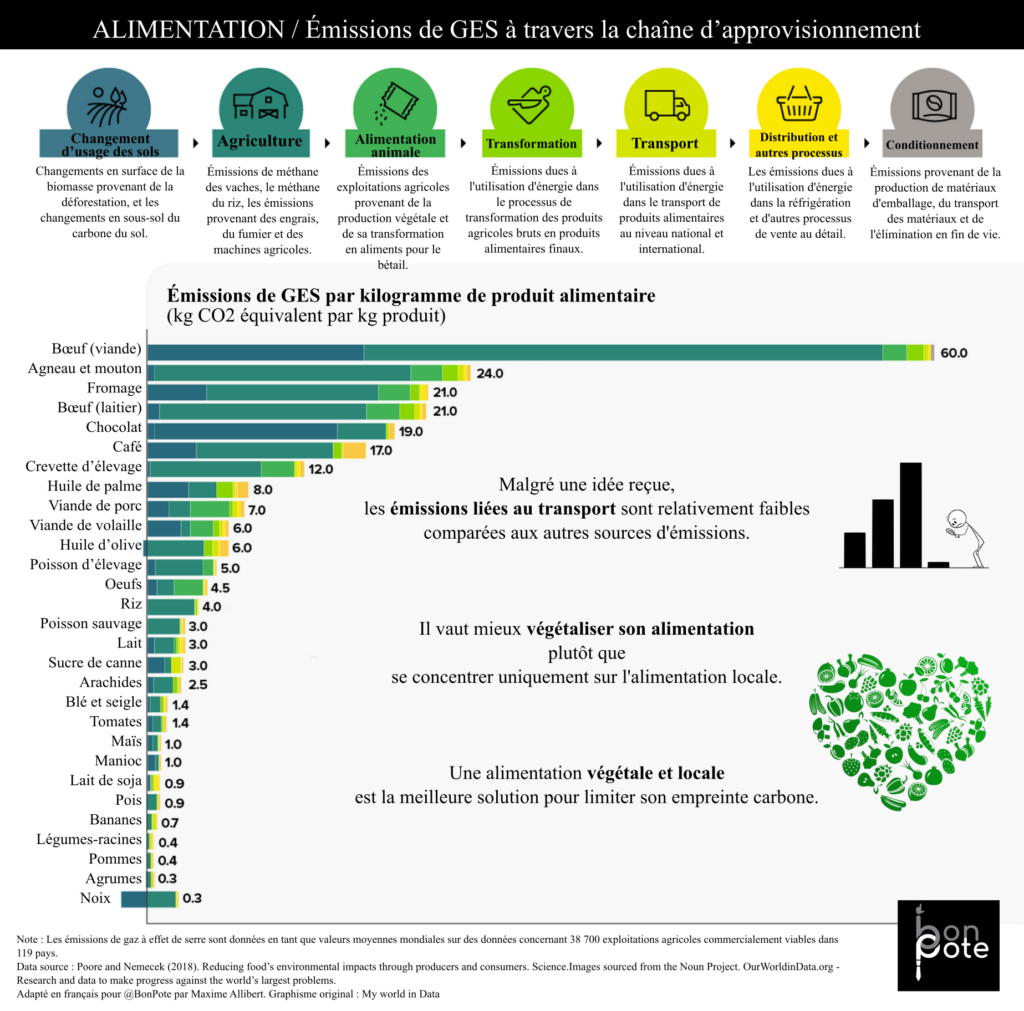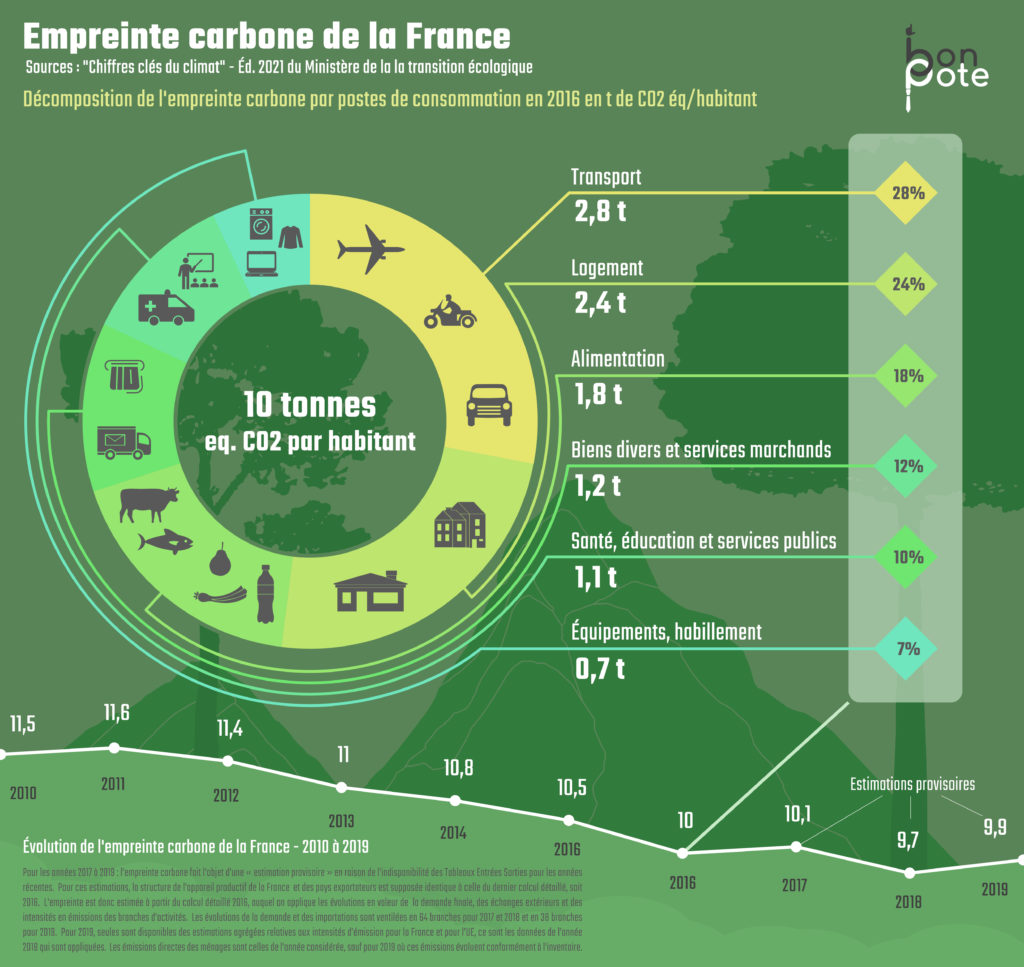Following this letter, which was addressed to parents and grandparents (and which could very well have been addressed to children, brothers and sisters…), I received the following remark: “and now, what do we do? Your letter is very good, but what do we do now? You should make a list of 5 to 10 actions, easy to implement and within everyone’s reach.”
Challenge accepted. Here is the 10 steps list to go green. It is primarily aimed at people who, like me a few years ago, are discovering how catastrophic climate change is and how it risks exacerbating all the other troubles of our society. It’s never too late to change…
1/ Deconstruct
There is no real order in these 10 actions, but if there is a precondition for all the other actions, it is to accept to deconstruct. Accept to carry out a self-examination. Accept that what you might have learned for years about certain subjects is wrong. I’m warning you, change is not necessarily pleasant for everyone. What is certain, however, is that it is necessary for 99% of the people who will read this text.
This potentially means challenging your daily life, starting with your work. Of course, if you work for Total or BNP, it will be tough to present yourself as an environmentalist. Yes I know, #NotAllTotal. But still. Of course, it is not only work that will be called into question; it will also potentially be your leisure activities, the way you eat, move around, and fly away (we will come back to this). There is a need for a system change and if you are not ready to change it or to change yourself, you can close this article!
PS: you will also have to be prepared to question the accepted ideas about certain notions and words. For example, an anarchist is not an ugly store front breaker. A ZAD is not a place where folks are only there to ‘fuck up and get the RSA’. Green energy does not exist. Neither does the green airplane. On the other hand, magic money do exist! A new world is open to you, enjoy the ride as we say in the Bouchonnois.
2/ Calculate your carbon footprint
By far the quickest way to see how much effort you need to make (and where to make it) is to calculate your carbon footprint. An article has been written especially on this subject: it will take you 5 minutes to calculate your carbon footprint. Guaranteed slap in the face! From this action will follow at least 3 of the next…
3/ Getting trained
It is not possible to propose relevant solutions without having properly defined the problem. Good news: training is easy and freely available on the internet! Here are 2 links that will meet your expectations:
– The best sources on the environment and climate: training for all levels, and all formats (podcasts, articles, videos, etc)
– The essential books on the environment and climate: thousands of pages that will make you an expert on these subjects!
There are at least several hundred hours of content. Be careful, because once you start to get interested, it’s hard to go back…
4/ Less (no more) flying
If you have calculated your carbon footprint and have flown, I imagine that you now know the catastrophic impact of air travel. And yes: a single return trip to New York, Dubai, Bali, etc. is enough to exceed your carbon budget… for the year!

To move towards a carbon-neutral world, the solution is obvious: we need to travel less and travel better. So avoid flying as much as possible. I am the first to be pissed off by this, but you have to be a bit consistent… To learn more about the subject, this more comprehensive article will answer most questions on the subject.
5/ Reduce your consumption of animal products
This is certainly the quickest action to take, if not the “easiest”: reduce your meat consumption, or even stop eating meat. A less meaty diet has many advantages, including reducing its impact on living things. Very important: for an order of magnitude, it is more important to veganise one’s diet than to eat locally (which has other benefits, notably social and economic).
PS: No, eating meat is neither “natural” nor essential. Moreover, the concept of natural food does not really make sense. See action 1!
6/ Less brrr brrr
It is a religion in France and it is certainly the most difficult issue to solve: reducing transport emissions. Today, 32% of emissions in France are caused by transport. An example:although their workplace is less than 2km away, 53% of French people go there by car. Another example: picking up a baguette in a 2-ton SUV may be legal, but in a sustainable world, it doesn’t exist.
Everyone should be aware of the ecological impact of a car, from its purchase to its use. While waiting for a more complete article: YES, electric cars are more “ecological” than thermic ones. Or rather, it is “less worse”. At the risk of repeating ourselves: we need to move less, move better. This simply means favouring less polluting means of travel, and neither the car nor the plane fall into this category.
NEWSLETTER
Chaque vendredi, recevez un condensé de la semaine, des infographies, nos recos culturelles et des exclusivités.
+30 000 SONT DÉJÀ INSCRITS
Une alerte pour chaque article mis en ligne, et une lettre hebdo chaque vendredi, avec un condensé de la semaine, des infographies, nos recos culturelles et des exclusivités.
7/ Ecology is not just about CO2
If you have looked a little deeper into point /3 (training), you now know that ecology is not just about CO2. Debates often focus on CO2, but it is only one problem or approach to interpreting the ecological challenges of the 21st century. So be careful not to turn into Mr. Know-it-all, and think that once a carbon-neutral world is achieved, we are all saved. Some people even think that all we have to do is put nuclear power everywhere, electrify everything and we’ve won the game (yes yes, I see this every day on social networks).
Behind these CO2 issues lie relationships of domination, power, social, ecological and gender injustices, etc. Furthermore, while CO2 is a very important issue, we did not wait for it to become critical to cause a steep decline in biodiversity over the last 40 years.
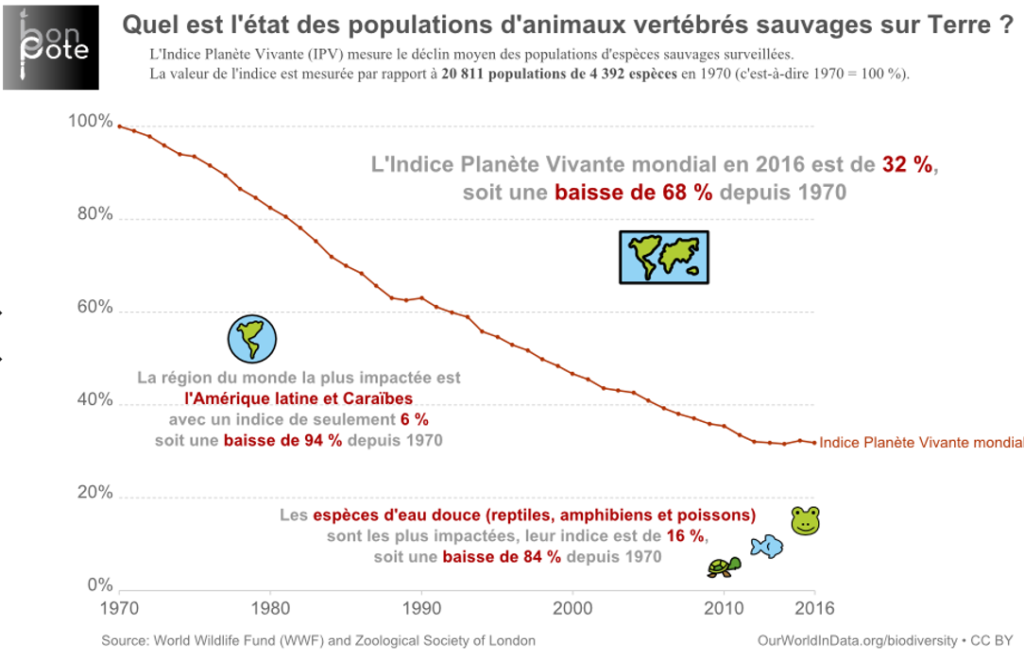
8/ Ordre of magnitude, always!
Any action that goes in the right direction, i.e. reducing your footprint on living things, is welcome. However, some are much more effective than others, and sometimes less restrictive.
It’s no coincidence that every Monday I present a #orderofmagnitude on social networks: once you understand the problem, you might as well act as effectively as possible. In the same logic, you’ll understand why I smile (and feel like dying inside) when someone tells me they’re green because they sort their waste… while coming back from 10 days in the Dominican Republic because it’s cool to have a tan in winter.
Orders of magnitude make it possible to realise the impact of what we do on a daily basis (without becoming a carbon-counting freak) and it is essential to have them in mind. One more for the road: the average carbon footprint of a French person is 10 tons CO2eq. Target carbon footprint is just below 2t CO2eq per capita. This gives you an idea of the scale of the task…
9/ Make a move
Once you’ve realised the scale of the problem and got past the ‘wow anyway, what a slap in the face’ stage, you can take the step that everyone agrees keeps you optimistic and/or makes you feel better: make a move.
There is not one type of green but millions of possibilities to be green. Everyone will find the way to act that suits them best, which will certainly evolve with time and your understanding of the action levers that worked/not worked. You can first do some work on yourself, your family, your company, your city, your Regional Council, etc. Thousands of possibilities to act, according to your preferences and possibilities.
10/ Spreading the word
In connection with action 9/, it is essential to spread the word, and where necessary, help others. For example, there is a huge difference between the scientific consensus on man-made global warming and public opinion. Although this is multifactorial, lack of information is undoubtedly one of the reasons. Also, 3 actions to keep in mind:
- If reducing your carbon footprint becomes too difficult for too small a gain, then help someone else make a big change with a big gain instead. #orderofmagnitude, again and again.
- We must avoid the bubble effect: we tend to think that if those around us have understood the problem, all French people have. Unfortunately, this is far, far from being the case (otherwise, no politician would talk about punitive ecology).
- There is no point in being right on your own. Systemic change will not happen because you are right alone in your corner (unless you are President of the Republic
and you don’t respect anything). You will meet people who will blow you off, question your choices, make fun of you, etc. Be patient, it’s a long way!
The last word
The more you read about the subject, the more you will realise the immensity of the issues at stake. The good news is that you will never be bored!
These 10 simple actions to go green are important but not exhaustive. Housing and consumption were not mentioned, although these are two very important elements. We can’t stress enough the importance of putting on a jumper in winter instead of turning on the heating while wearing a t-shirt… don’t laugh, it’s true! Also, after action 3 (get trained), you will have understood that there is no single solution to a systemic problem and that without system change, we will have no chance of meeting our climate goals.
Being green also means rethinking the way we consume, understanding that sobriety is essential to achieve our climate objectives, questioning our habits, our leisure activities… and fighting greenwashing! You will see that after action /3 (training), you will make a different face when you hear about zero-carbon airports…
Good luck to all of you, and if you go green try to keep your job and a few friends, they can always help.
BONUS: INFOGRAPHICS
